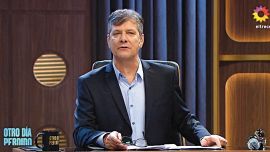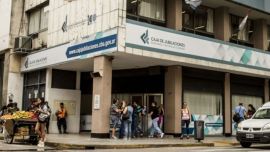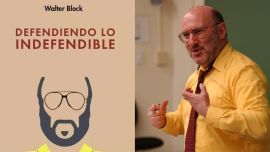Prosecutors in Argentina this week asked a judge to sentence Vice-President Cristina Fernández de Kirchner to 12 years behind bars, as they accused her of having led "the biggest corruption scheme ever known in the country."
Addressing a court in Buenos Aires by videoconference, Prosecutor Diego Luciani said he also sought "special life disqualification" from public office for Fernández de Kirchner, who he accused of overseeing "the biggest corruption scheme ever known in the country."
Fernández de Kirchner, who is standing trial along with 12 others in a case probing alleged public works graft mainly during her 2007-2015 terms as president, denies the allegations against her and claims she is a victim of political and judicial persecution.
The so-called ‘Vialidad’ trial began in 2019 and centres on alleged irregularities in the awarding and overpricing of tenders for public works projects in the southern province of Santa Cruz, the political base of the Kirchner family. Most of the contracts were won by firms linked to businessman and Kirchner family ally Lázaro Báez, who has since been convicted of corruption. Two high-profile ex-government officials, Julio De Vido and José López, are also among those in the dock.
"At least 12 people have been involved in the fraud. Only the articulated intervention of all the officials, in collusion with Lázaro Báez, allowed for the success of the manoeuvre," Luciani told the court.
"The state is the victim of these crimes. The entire citizenry was the victim of the abuses of power. The defenceless society today looks to prosecutors and judges as the last hope in the face of these outrages. The prosecutor is the guarantor of the rule of law," he said.
"Cristina Fernández [de Kircher] held the highest position and used her competences and power to achieve the ultimate profit of this manoeuvre," said the prosecutor, who accused the vice-president of "prioritising personal interest over the public interest" and "defrauding society."
"These were systematic acts of corruption promoted and maintained by the country's top political leaders that swept away all the principles of public procurement and caused a very serious damage against the state's coffers," he said at the end of the presentation of the pleadings.
"Corruption was the rule," he said on the final day of hearings for the prosecution.
Magnitude
Moving onto his sentencing request, the prosecutor declared that he could not find "a single mitigating factor" for the 69-year-old vice-president, whom he considered to be the "head" of the “illicit association” that ensured Báez won tenders.
From the list of aggravating factors, he pointed out the "magnitude" of the crimes investigated, "her power of direction", the "extent of the damage" and the "personal gain" pursued by the vice-president, condemning a “lack of repentance” on her part.
Prosecutor Sergio Mola had opened Monday's ninth and final hearing by reviewing the details of the case. In the session, carried out by videoconference and streamed live on the Internet, the investigator claimed that the defendants "drew up a plan" that sought to defraud the state through "discretion in the use of funds."
"There were systematic irregularities in 51 tenders over 12 years. The evidentiary picture demonstrates the illicit manoeuvres conclusively,” said Mora in his closing argument. “It is not credible that Cristina Fernández [de Kirchner] was not aware of anything in the solitude of her office."
The case also probes the 2003-07 period when Fernández de Kirchner’s late husband Néstor Kirchner, who died in 2010, was president.
CFK requests extension
With both representatives from the Public Prosecutor's Office now having made their case, attention now turns to the defence bench. At present, the 13 defendants in the dock have 10 working days to begin presenting the case.
A verdict is expected before the end of the year, though any guilty ruling would likely be challenged by the vice-president on appeal. For the sentence to be carried out, it would have to be ratified by the Supreme Court. Even if she is convicted, Fernández de Kirchner would still be free to run as a candidate in the 2023 presidential and legislative elections.
Responding to events in court on Monday, the Senate chief said in a series of posts on social media that she had asked her legal team to request an extension.
"In open violation of the principle of defence at trial, [the prosecutors] posed questions in their indictment that had never been raised," the former president wrote.
Gregorio Dalbón, one of the vice-president's lawyers, said the request sought to ensure a "right to a legitimate defence at trial," despite the fact that the indictment stage is already over.
"Prosecutors Luciani and Mola are going outside the rule of law and building a media narrative so that society has a common sense and believes that Cristina Fernández de Kirchner was the head of an illicit association to direct public works," the lawyer alleged.
Fernández de Kirchner has previously requested the recusal of judges Rodrigo Giménez Uriburu and Jorge Gorini, as well as prosecutor Luciani, but those requests were dismissed.
Narrative
With the headlines dominated by the court case, allies of the former president took to social networks on Monday to defend Fernández de Kirchner and back her narrative that she is a victim of political persecution.
Foreign Minister Santiago Cafiero said that the “extreme right” wanted to “outlaw” the vice-president, while another ally Hebe de Bonafini, the leader of the human rights organisation Madres of Plaza de Mayo, has called for demonstrations. "We cannot allow Cristina to be convicted or to go to prison. We have to hold a demonstration, it's the only thing that will save her. We have to defend her with everything," she said last week.
On Sunday, a public letter signed by more than 500 mayors backed Fernández de Kirchner, calling for an end to the campaign of persecution against her. Deputies from the ruling Frente de Todos congressional caucus and other political and cultural leaders also issued statements of support.
Fernández de Kirchner has been acquitted in several court cases for alleged crimes during her two terms as president, but still faces five ongoing trials.
In the dock
Federal prosecutor Diego Luciani also concluded his plea against other defendants in the trial for alleged irregularities in public works in Santa Cruz.
"It's corruption or justice," said Luciani at the August 22 hearing, moving on to detail his requests for those in the dock, which in all cases includes imprisonment, perpetual disqualification from holding public office, legal accessories and payment of costs.
In the case of Cristina Fernández de Kirchner, the prosecutor asked for 12 years for considering her "head of the aggravated illicit association and aggravated fraudulent administration against the public administration."
The same fate befell Lázaro Báez, the Patagonian businessman and former owner of Austral Construcciones, considering him the "primary responsible participant."
For ex-federal planning minister Julio De Vido, Luciani asked for 10 years in prison, the same amount as former public works secretary José Francisco López, allegedly known as "the man with the bags." The latter is accused of reporting directly to the vice-president about public works projects in Santa Cruz, as well as having a link with Báez.
Another who could also spend a decade in prison is Nelson Periotti, the former head of the National Directorate of Roads (DNV) during the Kirchnerite era, described by prosecutors as the "organiser" of the criminal manoeuvres.
For Mauricio Collareda, former head of the DNV in Santa Cruz, the prosecutor asked for six years in prison; for Juan Carlos Villafañe, head of the AGVP provincial roads body between 2006 and 2007, six years in prison, while for his counterpart Raúl Gilberto Pavesi five years; for Raúl Daruich, also of the DNV, five years was requested.
Former public works undersecretary, Abel Fatala, is facing a potential sentence of four years, as is José Raúl Santibáñez, a former head of the AGVP board of directors.
Héctor René Jesus Garro, could receive a three-year suspended prison sentence based on the prosecutor's request. He was president of the AGVP. If convicted, he will have to submit his residence to operations and submit to control of the justice system.
Carlos Santiago Kirchner has been acquitted of the charge against him, but a two-year suspended prison sentence is being sought.
– TIMES/AFP/PERFIL




















Comments